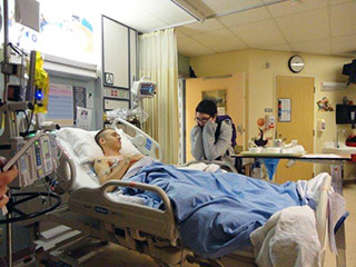Most liver transplant patients stay in the hospital for 10 days to four weeks after their surgery. However, you may need to stay longer if any problems come up while you recover.

Critical care unit
Normally, teens spend their first couple of nights after surgery in the critical care unit (CCU). Here, you will be monitored very closely. An ultrasound and liver scan are normally done on the first day after transplant.
Many factors affect when you will move from the CCU to the transplant ward. For most teens, this happens one to three nights after the transplant surgery.
Transplant ward
When you are on the ward, your diet will slowly start to change and you will start to spend short periods out of your bed to keep your body healthy.
- It may take several days for you to have a bowel movement (poo). There are many reasons for this, including the surgery itself and pain relief medicines, which can slow down your bowels. Your team will ask you to get out of bed every day. This helps to prevent complications and helps make your bowels move. We can also give you medicine to help with this process.
- The team will slowly change your diet from clear fluids (example water, ice chips, freezies) to full fluids (liquid food) and then from full fluids to solid food.
- You will be asked to do deep breathing and coughing every hour while you are awake to help your lungs stay healthy.
- You will start learning about your medications and eventually be asked to practise taking all your medications on your own.
You will take some of the immunosuppressant medications for the rest of your life. It is important that you are familiar with them. Your transplant pharmacist will guide you at first and will work with you even after you are discharged from hospital.
How you can help your recovery
Take all your medicines and start to learn about them.
Follow the diet recommended by your dietitian.
Do the exercises that you are given by the transplant team. At first, these will only involve deep breathing and coughing and getting out of bed.
Avoid being around anyone who has an infection. Ask family and friends not to visit you in the hospital when they are not feeling well.






